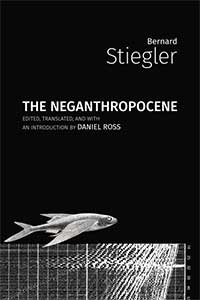The Neganthropocene
by Bernard Stiegler
Edited and translated by Daniel Ross

- CCC2 Irreversibility
- Published: 2018
- ISBN: 978-1-78542-048-1
- PDF ISBN: 978-1-78542-049-8
As we drift past tipping points that put future biota at risk, while a post-truth regime institutes the denial of ‘climate change’ (as fake news), and as Silicon Valley assistants snatch decision and memory, and as gene-editing and a financially-engineered bifurcation advances over the rising hum of extinction events and the innumerable toxins and conceptual opiates that Anthropocene Talk fascinated itself with—in short, as ‘the Anthropocene’ discloses itself as a dead-end trap—Bernard Stiegler here produces the first counter-strike and moves beyond the entropic vortex and the mnemonically stripped Last Man socius feeding the vortex.
In the essays and lectures here titled Neganthropocene, Stiegler opens an entirely new front moving beyond the dead-end “banality” of the Anthropocene. Stiegler stakes out a battleplan to proceed beyond, indeed shrugging off, the fulfillment of nihilism that the era of climate chaos ushers in. Understood as the reinscription of philosophical, economic, anthropological and political concepts within a renewed thought of entropy and negentropy, Stiegler’s ‘Neganthropocene’ pursues encounters with Alfred North Whitehead, Jacques Derrida, Gilbert Simondon, Peter Sloterdijk, Karl Marx, Benjamin Bratton, and others in its address of a wide array of contemporary technics: cinema, automation, neurotechnology, platform capitalism, digital governance and terrorism. This is a work that will need be digested by all critical laborers who have invoked the Anthropocene in bemused, snarky, or pedagogic terms, only to find themselves having gone for the click-bait of the term itself—since even those who do not risk definition in and by the greater entropy.
The urgent question today is not how we got into the Anthropocene – it’s a bit late to worry about that – but how we might get out of it again, with lives worth living and a world worth living in. Bernard Stiegler’s The Neganthropocene starts to think the way to a future beyond our current impasses and dilemmas.Steven Shaviro, Wayne State University
Stiegler offers a unique series of tactics to disrupt and short circuit the entropic ubiquity of the Anthropocene. The Neganthropocene is a jubilant escape route, a will to transformative and politically accountable chaos that remaps agency, power, semiocapitalism.Patricia MacCormack, Anglia Ruskin University
Bernard Stiegler is the most important French theorist to come after Derrida, and one of the most important thinkers anywhere about the effects of digital technology. The Neganthropocene is a provocative and challenging work.David Golumbia, Virginia Commonwealth University
Author Bio
Bernard Stiegler is a French philosopher who is director of the Institut de recherche et d’innovation, and a doctor of the Ecole des Hautes Etudes en Sciences Sociales. He has been a program director at the Collège international de philosophie, senior lecturer at Université de Compiègne, deputy director general of the Institut National de l’Audiovisuel, director of IRCAM, and director of the Cultural Development Department at the Centre Pompidou. He is also president of Ars Industrialis, an association he founded in 2006, as well as a distinguished professor of the Advanced Studies Institute of Nanjing, and visiting professor of the Academy of the Arts of Hangzhou, as well as a member of the French government’s Conseil national du numérique. Stiegler has published more than thirty books, all of which situate the question of technology as the repressed centre of philosophy, and in particular insofar as it constitutes an artificial, exteriorised memory that undergoes numerous transformations in the course of human existence.
Editor and translator
Daniel Ross has translated numerous books by Bernard Stiegler, including most recently Nanjing Lectures 2016-2019 (Open Humanities Press) and The Age of Disruption: Technology and Madness in Computational Capitalism (Polity Press). With David Barison, he is the co-director of the award-winning documentary about Martin Heidegger, The Ister, which premiered at the Rotterdam Film Festival and was the recipient of the Prix du Groupement National des Cinémas de Recherche (GNCR) and the Prix de l’AQCC at the Festival du Nouveau Cinéma, Montreal (2004). He is the author of Political Anaphylaxis (OHP, 2021), Violent Democracy (Cambridge University Press, 2004) and numerous articles and chapters on the work of Bernard Stiegler.
